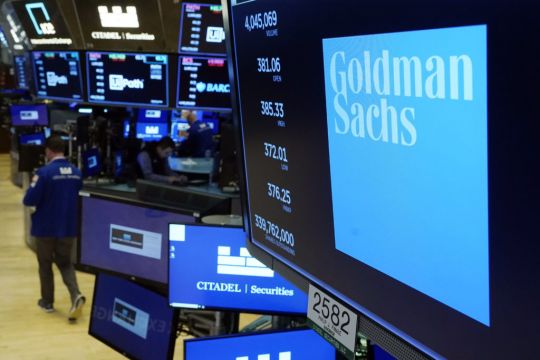Goldman Sachs has said its fourth-quarter profits fell by 13% from a year earlier, largely due to the bank preparing to pay out hefty pay packages to its well-compensated employees.
It is the latest sign that wages are increasing sharply, particularly on Wall Street. Most of the major banks who have reported their results so far have indicated plans to pay employees more in the upcoming year.
The New York-based investment bank earned a profit of 3.94 billion dollars (£2.90 billion) or 10.81 dollars a share. That is down from 4.51 billion dollars (£3.32 billion), or 12.08 dollars a share, in the same period a year earlier.
The results missed expectations of analysts who were looking for on average a profit of 11.80 dollars a share, according to FactSet.
While Goldman was able to grow revenues in the quarter, the gains were more than wiped out by the firm’s compensation expenses. The bank set aside 3.25 billion dollars (£2.39 billion) to cover compensation and benefits in the quarter, up 31% from a year earlier.
Goldman typically has high compensation expenses, particularly in the last quarter of the year as the bank prepares to pay out its annual bonuses to employees.
These bonuses can often be multiple times an employee’s salary, particularly the firm’s best-paid traders and investment bankers.
But rising inflation, as well as growing competition for employees among the investment banks, has pushed wages significantly higher at the banks. Bloomberg News reported late last week that the firm was preparing to pay out special one-time bonuses to keep its most valuable employees.
“It is clear that employees are able to demand significantly higher pay without necessarily having to justify the increase through greater productivity,” said Octavio Marenzi, chief executive of consulting firm Opimas LLC.
Pay at the firm is tied directly to how well the overall company does in the year, and this year was incredibly good for Goldman. The firm made 21.64 billion dollars (£15.91 billion) in profits last year, more than double what it earned in 2020.
Deal making and trading remained mostly strong last quarter for the firm, which helped drive profits. Investment banking revenues were 45% higher than the previous year. Trading revenues were down a modest 7%.
The firm’s return on equity — a measurement of how well a bank performs with the assets it holds — was 23% last year, more than double where it was a year earlier. Banks like Goldman aim for their return on equity to be above 10%.







